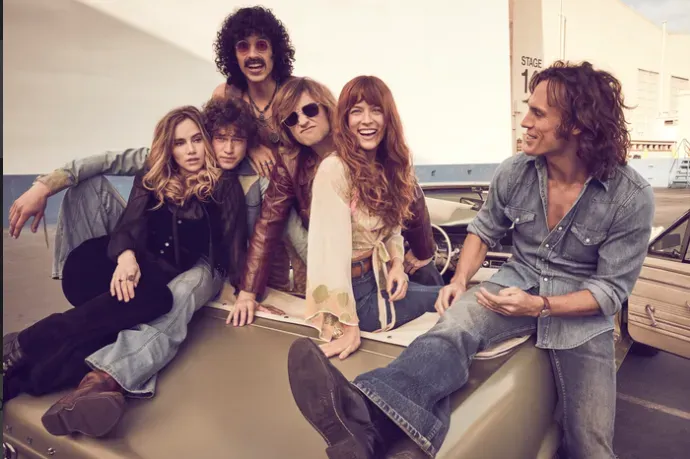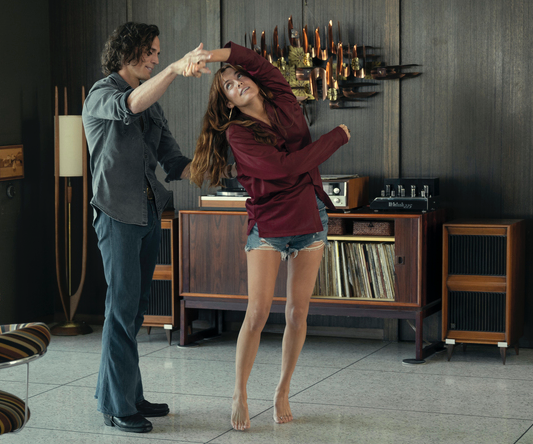Tell Your Father to Give Her a Call: Why Daisy Jones Is the Best New Show
Music and movies are now aligning: Riley Keough is at her peak — Why Daisy Jones + The Six is the best new show on TV, Season 2 inevitable.

Love and pride don’t mix — but they make Daisy Jones + The Six the best new show on TV.
They also top music charts — and the book is still a №1 bestseller.
For this superstar band, spring 1977 was “our moment when you least want things to change,” but “they always do. It’s called a moment for a reason.”
Season 2 is now inevitable because the best stories keep going. So what happens when your dreams come true and are not enough? Daisy asks, “I wanted this life since I was 14 years old, so why are we so unhappy?”
The chosen ones never know they’re chosen. The stories within the story of seven 1970s rock stars (and a photographer) are all about love, family, fame, addictions, recovery, creativity, culture, and music.
“It’s like some of us are chasing after our nightmares the way other people chase dreams.” ― Taylor Jenkins Reid, Daisy Jones & The Six
The ’70s was the era when the Sexual Revolution and the drug culture peaked, but Daisy explains the wildest young people of that time found, “You take drugs to escape, to dull emotions — but drugs heighten your emotions.”
“The world won’t remember me, but they will remember the music,” Teddy, the artist who brings Daisy and The Six together, concludes.
The answer to art? Daisy is one of those little girls scribbling all the answers in her journals.
Billy, the band leader, sees Daisy could write “something that felt like I could have written it, except I knew I couldn’t have. I wouldn’t have come up with something like that. Which is what we all want from art, isn’t it?”
The actual art is “When someone pins down something that feels like it lives inside us? Takes a piece of your heart out and shows it to you? It’s like they are introducing you to a part of yourself.”
The story starts in 1997–20 years after the implosion of the biggest rock band of the 1970s, and the music and the memories weave together with a perspective you only have looking back 20 years later.
“History is what you did, not what you almost did, not what you thought about doing. And I was proud of what I did” ― Billy Dunne in Daisy Jones & The Six.
But when you watch the 10-episode first season on Amazon Prime, pay attention to the baby girl, the hidden key to the bigger story.
She’ll wind up putting all the pieces together because the 1970s story is the basis of her identity.
Today, everyone can shoot videos of everything, but Daisy Jones (starting in 1968) shows us an era much like our own (massive division and social changes) when we needed music to mend our brokenness.
So this story (shifting between the 1970s and 1997) requires photographers to dig down to the roots of the relationships, transforming, saving, and capturing all.
“Everything that made Daisy burn made me burn,” band leader Billy Dunne explains. “Everything I loved about the world, Daisy loved about the world. Everything I struggled with, Daisy struggled with. We were two halves. We were the same.”
When you are so much like another broken person (whose brokenness makes them a creative powerhouse), Billy sees, “you don’t even feel like you have to say your own thoughts because you know the other person is already thinking them.”
But what happens when you feel all that yet constantly know there’s a better choice, a better spouse, a greater destiny meant to make a family?
“You have these lines you won’t cross. But then you cross them. And suddenly, you possess the very dangerous information that you can break the rule and the world won’t instantly come to an end.
“You’ve taken a big, black, bold line and you’ve made it a little bit gray. And now every time you cross it again, it just gets grayer and grayer until one day you look around and you think, There was a line here once, I think.”
― Taylor Jenkins Reid, Daisy Jones & The Six
So Billy can’t help but be “mesmerized” by Daisy Jones, and neither can the fans because Daisy is brought to life by Riley Keough, the 33-year-old rising star who is in the news because she’s the primary heir to Lisa Marie Presley (who died January 12) and the eldest grandchild of Elvis Presley.
“Passion is… it’s fire,” Billy explains. “And fire is great, man. But we’re made of water. Water is how we keep living. Water is what we need to survive. My family was my water. I picked water. I’ll pick water every time. And I wanted Daisy to find her water. Because I couldn’t be it.”
But Daisy is irresistible. Millions love her more than her mother seems to love her, and her mother explains that it’s because they don’t know her. Daisy refuses to be “the muse” because she wants to be “the person.”
“I used to think soul mates were two of the same. I used to think I was supposed to look for somebody that was like me. I don’t believe in soul mates anymore and I’m not looking for anything.
But if I did believe in them, I’d believe your soul mate was somebody who had all the things you didn’t, that needed all the things you had. Not somebody who’s suffering from the same stuff you are.”― Taylor Jenkins Reid , Daisy Jones & The Six
Today’s world likes to tell women they never had power and were victims, but Daisy Jones reminds us that women have been seizing authority and changing narratives since the Garden of Eden.
They are two natural disasters that need to heal. So Billy soon finds how easy it is to be crushed by a woman and notices, “women always seem to get back up. Do you ever notice that? Women are always still standing.”
“I wish someone had told me that love isn’t torture. Because I thought love was this thing that was supposed to tear you in two and leave you heartbroken and make your heart race in the worst way. I thought love was bombs and tears and blood.
I did not know that it was supposed to make you lighter, not heavier. I didn’t know it was supposed to take only the kind of work that makes you softer. I thought love was war. I didn’t know it was supposed to… I didn’t know it was supposed to be peace.” ― Daisy in Daisy Jones & The Six
Billy aches because he sees things he doesn’t want to see, telling Daisy, “I know what it looks like when you’re in love with someone.”
Daisy explains that music is never about the music itself, seeing Billy’s power. So she winds up being the story’s primary spiritual leader, asking, “Do you think things happen for a reason?”
Daisy comes close to death more than once, expecting to encounter angels and Heaven but feeling nothing and getting thrown into second guessing. Billy shows her life remains — even in death, that there must be more because of how they’ve lived without rules or boundaries: “We should’ve been dead.”
“You’re telling me there’s no one out there looking out for us?” Billy asks. “Come on.”
But Daisy’s husband (a prince) nails Billy’s power by telling her, “When he’s in the room, you’re not yourself.”
But broken Billy is also someone whose “never been OK.” When he wants Daisy, he says, “Let’s be broken together,” which makes Daisy realize, “I don’t want to be broken.”
“I almost died the other night — I was this close,” Daisy tells a sold-out concert of fans. “But I’m alive tonight, and you’re alive tonight, so let’s just stay alive a little bit longer.”
“No matter who you choose to go down the road with, you’re gonna get hurt. That’s just the nature of caring about someone. No matter who you love, they will break your heart along the way.” ― Taylor Jenkins Reid, Daisy Jones & The Six
And yet, after all their glories, crashes, and everything in between, it will be the least likely person who sees what others don’t see, who tells her daughter, “Tell your father to give her a call.”
Because everything does happen for a reason, even when the timing doesn’t always seem right — when you’re stuck in a particular moment.

“If she knew how often I was thinking about her, she wouldn’t feel lonely.” ― Taylor Jenkins Reid, Daisy Jones & The Six
Used with permission from Joseph Serwach, who is not otherwise affiliated with TDE. This essay originally appeared at Medium.com
